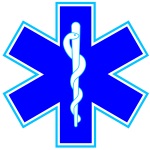Nasogastric or Orogastric Tube: Difference between revisions
From Protocopedia
mNo edit summary |
m Treloars moved page Nasogastric/Orogastric Tube to Nasogastric or Orogastric Tube |
||
(No difference)
| |||
Latest revision as of 17:53, 1 February 2018
Procedure Guidelines
9.23 NASOGASTRIC/OROGASTRIC TUBE
Contact Medical Control for Physician's Orders
INDICATIONS:
- Gastric decompression
CONTRAINDICATIONS:
- Absolute – Known or suspected esophageal varices
- Relative – Ingestion of caustic poison
EQUIPMENT:
- 14, 16 or 18 Fr. Levin tube, (for adults).
- 35 cc syringe.
- Water soluble lubrication gel.
- Tape.
- H2O.
- Saline.
PRECAUTIONS:
- It will be difficult and painful to pass tube on a patient with a deviated septum or nasal obstructions.
- In conscious patients, gag reflex will be elicited. If patient gags, pause insertion allowing patient to take breaths or drink a few sips of water.
- Epistaxis is a common complication.
- If tube curls up inside pharynx, withdraw it and re-insert.
- It is possible to inadvertently intubate trachea with NGT.
PROCEDURE:
CONTACT MEDICAL CONTROL FOR PHYSICIAN'S ORDERS.
- Mark distance tube should be inserted by measuring from nose to ear lobe to below xyphoid process.
- Lubricate distal 6 - 8" of NGT.
- Examine nose for septal deviation. Use right nares if both nostrils are the same size.
- Place patient in semi-fowler's position, if condition permits and slightly flex head.
- Insert tube in nostril and gently pass tube into nose or thru King Tube.
- Encourage patient to swallow as tube is advanced to pre-determined depth.
- Confirm tube placement by aspirating gastric contents and by auscultating epigastrium while injecting 20 -30 cc air through tube.
- Aspirate stomach contents and irrigate concomitantly, as ordered.
- Tape tube in place and maintain suction if ordered.
